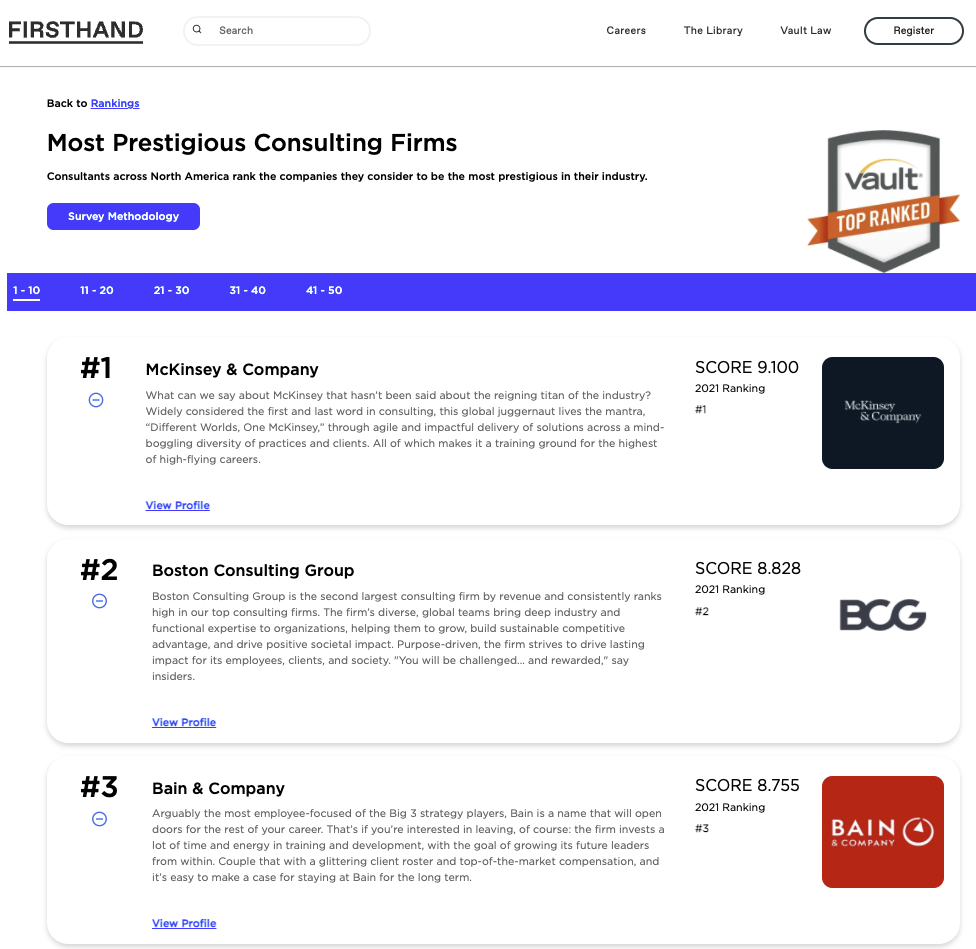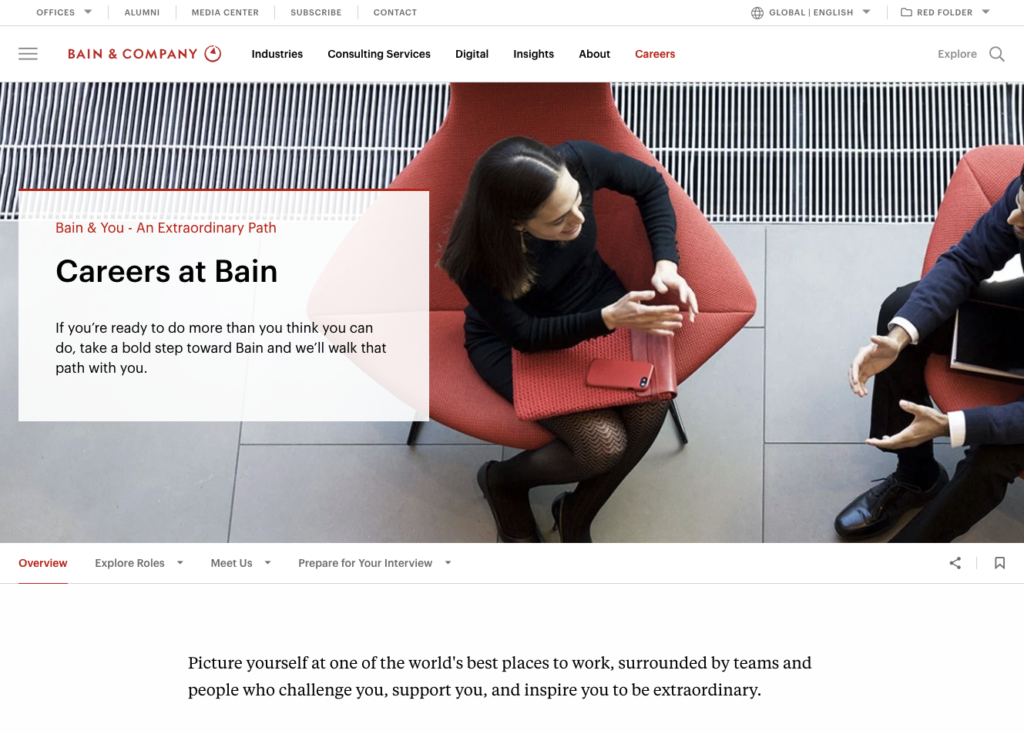What is strategy consulting?
Strategy consultants support businesses with developing and implementing business strategies. It is considered to be the most prestigious form of consulting.
They work across every industry, including both the public and private sectors. However, they tend to deal with long-term, high-impact, strategic decisions. They typically work with C-level executives.
The difference between strategy consulting and management consulting
Management consulting is a general advisory profession that supports organizations solve issues anywhere across the business. Examples include operations, financial management, people and change, and technology. Management consultants work with leaders at any level across the organization.
Strategy consulting is a subset of management consulting. It is focused on the biggest and most strategic problems that organizations face.
Why do organizations bring in strategy consultants?
There are a few reasons why organizations use strategy consultants:
- Guaranteeing an impartial perspective: Organizations want to eliminate any biases that may exist in their organizations (e.g. Executives pushing for a certain outcome or a bias against new approaches). This is particularly important for decisions with significant consequences.
- Bringing in best practices: Consultants bring in best practices from other industries and competitors, which may not be obvious to leaders in the organization.
- Augmenting internal teams: Most large organizations have internal strategy teams. Consultants are sometimes brought in to support those teams or when those teams do not have enough capacity.
- CYA: Executives often use consultants as a scapegoat if a decision results in a bad outcome. Basically, they can claim that “the consulting firm recommended this approach, it’s not my fault”. This is known as “cover your ass”.
Top strategy consulting firms
There are millions of consultancy firms around the world, but only a select few have truly international outreach and influence. And even within the world’s top consulting firms, there are distinct “classes” of firms.
MBB Firms
MBB firms (McKinsey, Bain, and BCG) are the three most distinguished strategy consulting firms. They are “pure-play” firms, which means they started as strategy houses, and only later branched into other forms of consulting.
Clients of McKinsey, Bain, and BCG are mainly looking for consultants to solve big, C-suite level issues that have a great impact on the company.
Joining an MBB firm gives you a head start from others in your field. They only accept the very top candidates, so it’s a strong signal of your talent and potential. Therefore, working at these firms results in excellent exit opportunities.

Mid-Tier Firms
Mid-tier firms also provide strategy consulting work to large corporates. Although they cannot compete head-to-head with MBB firms for most work, they generally have a few niches where they are strong. For example, L.E.K Consulting is a mid-tier firm that is particularly strong in healthcare and pharma.
Many of these firms have been acquired by larger firms. Monitor Group was acquired by Deloitte, Strategy& was acquired by PwC, and Parthenon was acquired by EY. Other still-independent mid-tier firms include Kearney and Oliver Wyman.
Despite not having the same reputation as MBB firms, mid-tier consulting firms are a great place to start a career. They are large enough to provide great training and experience, and have a strong enough reputation to offer good exit opportunities.
Boutique Firms
Boutique consulting firms are smaller consulting firms that have an industry focus (e.g. healthcare), functional specialization (e.g. operational improvement), or limited geographic scope (e.g. UK only).
Boutique firms are often run by ex-MBB consultants who’ve decided to open their own practice. And, although they don’t offer the same amount of formal training, these firms can be a great way to launch your career — especially if you intend to exit into the same specialization as the firm (e.g. moving from a healthcare consulting practice to a hospital group).
Big 4 Firms
EY, PwC, Deloitte and KPMG are considered as the “Big 4” in consultancy. Their clientele is often middle-management level instead of senior executives, and they typically work on less impactful problems (e.g. implementation, cost-cutting, PMO, etc).
Consultants at these firms have good benefits and a balanced work environment. Projects tend to be long-term, and you may spend months or even years with clients, which makes the firm (and you) practically integral to their companies.
Even though these firms have “Strategy” teams, they are generally not considered strategy consultants.
How to become a strategy consultant
Strategy consulting is considered highly prestigious, as it attracts the best talent from various fields. Because of this, it is difficult to break into strategy consulting.
Acceptance rates
Strategy consulting is considered to have one of the most competitive recruitment processes in the world. In fact, McKinsey & Co reportedly receive about 200,000 applications per year and hire only ~1.1% of candidates.
To put this in perspective, the acceptance rate of candidates at Goldman Sachs is said to be ~4.5%.
Entry points
There are a few different entry points for candidates wanting to enter strategy consulting:
- Undergrad hires: Some candidates are recruited from “target schools” after undergrad. These candidates will join at the entry-level (i.e. Business Analyst or Consultant).
- Graduate hires: The majority of candidates are recruited from top global business schools. All candidates are expected to have an MBA and join the firm at the Associate or Consultant level (i.e. one level above entry-level).
- Advanced degree hires: All top strategy firms also have pathways for advanced degree hires. These candidates will have a non-MBA advanced degree (e.g. Ph.D., J.D., M.D., etc). Pathways include the McKinsey Insight Program, BCG Bridge to Consulting, and Bain ADvantage.
- Experienced hires: Candidates with five or more years of experience may be hired as an experienced hire. This is especially true for unique skillsets or emerging industries.

Recruitment process
There are typically three stages to the strategy consulting recruitment process:
- Resume screening: The firm’s internal recruitment team will review all resumes and assess each candidates’ skills and experience.
- Screening test: Some firms require candidates to take a screening test, such as the McKinsey Problem Solving Test. These tests evaluate data interpretation and analytical thinking and are used to quickly narrow down applications.
- Interviews: Candidates then participate in a face-to-face interview. There are two components to this interview. Firstly, ‘fit’ interview, which tests your experience and motivations (e.g. the McKinsey Personal Experience Interview). And secondly, a case interview, which evaluates your problem solving and communication skills using a real-world business case study.
Characteristics of a good candidate
There are a few things that you can do to become a strategy consultant:
- Excel academically. Firms want high performers. If you come from a “target school” (e.g. Ivy Leagues, top business schools, etc), then you should aim to be in the top 25% of your cohort. If you come from a non-target school, you will need to be in the top 2-3% of your class.
- Outperform in the case interview. Case interviews are a simulation of real client interaction sessions where your consulting skills are put to the test. They also make up a large component of the interview process. Hone your structured thinking, problem-solving, communication, and creative thinking skills.
- Distinguish yourself: Many candidates will be academically strong and perform well in interviews. You will need to set yourself apart. What can you bring to the table that they can’t? Show that you have a breadth of experience and unique perspectives that you can bring to the role.
- Ace the fit interview: Many candidates spend a lot of time preparing for the case interview but ignore the fit interview. Fit interviews gauge your soft skills and experience. Show that you have a depth of experience, maturity, emotional intelligence, and empathy beyond that of your peers.
Strategy consulting salaries
Strategy consulting firms are considered to pay very well. For a recent graduate, the pay will be significantly higher than a typical corporate job but lower than investment banking, private equity or hedge funds.
They also pay higher than non-strategy management consultants, such as the Big 4 and Accenture. In some cases, salaries at strategy consulting firms will be 1.5-2x higher than their management consulting counterparts.
In the table below, we outline average salaries for McKinsey consultants:
| Role Title | Base Salary | Bonus | Total Salary |
|---|---|---|---|
| Business Analyst | $90,600 | $23,500 | $114,100 |
| Associate | $164,300 | $28,000 | $192,300 |
| Engagement Manager | $204,000 | $58,500 | $262,500 |
| Associate Partner | $225,000 | $177,000 | $402,000 |
| Partner | $1,000,000+ |
For comparison, you can also check out our salary table for Deloitte and Accenture.
How to succeed as a strategy consultant
Consulting is a complex and varied line of work. In our experience, the threemost important things required to succeed as a consultant include:
- Be a safe pair of hands: Your goal is to make your manager’s life easier, and your manager wants to delegate tasks and know they will be completed to a high standard. Ensure that you take “ownership” of your work, produce high quality materials, and finish everything on time.
- Don’t be afraid to ask questions: Nobody expects you to know everything immediately — but they do expect that you can learn things quickly. A manager’s biggest fear is a team member that tries to hide, rather than get something wrong. So ask lots of questions and build up your understanding of the engagement.
- Build strong relationships: Consulting is fundamentally a client business. As a new consultant, you have two clients: the company that your firm is working for, and your firm. Having strong advocates will help you get new opportunities and support your career growth.
But maybe some of the best advice for new consultants comes from Reddit…
